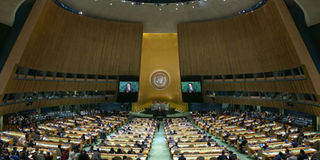Kenya makes appeal to UN on immunity for heads of state

The United Nations General Assembly. Kenya has asked the United Nations to seek an advisory opinion from the International Court of Justice on immunity for heads of state and other high-ranking national officials. PHOTO | KEVIN HAGEN | AFP
What you need to know:
- Ambassador Amayo asked Mr Guterres to include request for an advisory opinion as an agenda item for UNGA session that starts next month.
- If UNGA agrees to support the initiative, the UN’s International Court of Justice, would be asked to offer a non-binding opinion on the question of immunity for heads of state and other high-ranking national officials.
NEW YORK,
Kenya is calling for the United Nations’ judicial body to issue an opinion on whether national leaders are entitled to immunity in international legal proceedings.
The request came in a recent letter to UN Secretary-General Antonio Guterres from Kenyan UN Ambassador Lazarus Ombai Amayo, who was acting on behalf of the African group of UN member-states.
Ambassador Amayo asked Mr Guterres to include the African group's request for an advisory opinion as an agenda item for the UN General Assembly session that starts next month.
If the General Assembly agrees to support the Kenya-led initiative, the UN’s International Court of Justice, often referred to as the World Court, would be asked to offer a non-binding opinion on the question of immunity for heads of state and other high-ranking national officials.
“In recent years,” Ambassador Amayo told the UN chief, “the issue of immunities has become one of the most pressing issues in international law.”
AL-BASHIR CASE
The move spearheaded by Kenya takes place amidst opposition by some African countries to the International Criminal Court’s longstanding effort to prosecute Sudan President Omar al-Bashir for alleged crimes against humanity, genocide and war crimes. Those accusations are related to the conflict in Sudan's Darfur region.
On its part, the Kenyan government waged a long and ultimately successful campaign against the ICC’s indictment of President Uhuru Kenyatta for crimes against humanity.
Those allegations stemmed from the violence that took the lives of some 1200 Kenyans following the 2007 election. The case against Mr Kenyatta was dropped in 2014.
In an “explanatory memorandum” accompanying his recent letter to the UN chief, Ambassador Amayo says that the issue of immunity for national leaders is “of crucial concern” to UN member-states.
The Kenyan envoy observes that the legal obligations of UN members are derived from a variety of sources, including “customary international law.”
And that form of law makes provision for “the immunities of heads of state, a member of a government or parliament, an elected representative or a government official,” Ambassador Amayo writes.
'PROVIDE CLARITY'
Ambassador Amayo acknowledges in the memorandum that an ICC pre-trial chamber has ruled that under international law, immunity cannot be invoked for heads of state in regard to prosecution by an international court.
But Kenya’s UN representative also cites other, potentially conflicting rulings on the question of immunity for national leaders.
UN member-states will thus benefit, Ambassador Amayo writes, if the General Assembly seeks an advisory opinion from the World Court “that will provide clarity to the evident ambiguity and to competing obligations under international law.”
In response to Ambassador Amayo’s letter, Human Rights Watch said on Thursday that immunity should not be granted to heads of state and other national officials accused of war crimes, genocide or crimes against humanity.
Ms Elise Keppler, deputy director of the rights group’s international justice programme, told the Nation that “there should be no escape hatch for leaders.”
Exempting them from prosecution “would be an affront to victims and would set up a two-tier system of law,” Ms Keppler declared.




